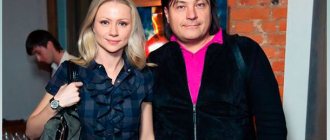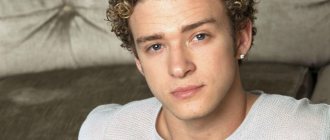Childhood of Maria Poezzhaeva
Maria Poezzhaeva was born on March 3, 1989 in Perm. She spent her childhood in a microdistrict known as “Krokhalya”. From an early age, the girl was engaged in figure skating at the local Orlyonok Sports Palace, but then the sport faded into the background - the girl became interested in theater, largely thanks to her mother. It was she who took her daughter first to the Perm Palace of Youth Creativity, then to the KOD theater studio.
The actress is still surprised how they took her there, because she even said the name of the author of the poem she was reciting incorrectly (“Baudelaire” with the emphasis on the first syllable). But, apparently, the commission members noticed a spark of talent in the teenage girl, who was so enthusiastically reciting a poem about a wounded albatross and the difficult fate of the poet.
Young actress Maria Poezzhaeva
Maria Poezzhaeva studied at school No. 124; She was an excellent student and showed great promise. Therefore, Maria’s decision to devote her life to the theater greatly upset the teachers - they assumed that the medalist would choose a scientific path.
Immediately after graduation, the girl left for St. Petersburg with the firm intention of becoming a student at a theater institute. But the attempt was unsuccessful, and upset Poezzhaeva returned to her native Perm. But the girl was not used to giving up and the next year she left to conquer the capital. But here, too, failure awaited her, and Maria had to return home again. This time she decided not to waste time and took the documents to the local theater institute, where she entered without any problems.
A year later, she nevertheless made another attempt to conquer the alluring capital, and this time her efforts were crowned with success - she was accepted into the Moscow Art Theater School. The girl considers her first day of school special: after classes, she and her fellow students went to the canteen, located in the theater building, and at the entrance she ran into Andrei Myagkov. The famous artist opened the door for Maria with the words: “Hello, welcome!” This meeting became a sign from above for Poezzhaeva: now, if something doesn’t work out for the actress, she remembers this day - it’s not for nothing that on September 1st Myagkov himself opened the door to the Moscow Art Theater for her!
Maria Poezzhaeva studied at the Moscow Art Theater School
Maria studied on Kirill Serebrennikov’s course and considered her group special. On the sidelines of the institute there was an opinion that the master recruited only students who were truly obsessed with the stage. Age and social status did not matter; the main condition was to belong to the theater with soul and body. It was these traits that Serebrennikov saw in his ward.
The actress always remembers studying at the Moscow Art Theater School with a smile: all her fellow students were a little crazy, and the disciplines they studied were also special. In plastic arts lessons, Kirill Semenovich’s students learned to show a clean and dirty body, and in music education classes, they learned to perceive music without notes. The main goal of Serebrennikov’s methodology was to train actors who were ready to play in the most non-standard projects. His students knew no prohibitions in art, they learned not to hide behind the roles of their heroes, but to speak on stage on their own behalf. And Maria Poezzhaeva coped with these complex tasks excellently.
Review: “He is a Dragon” by Indar Dzhendubaev with Maria Poezzhaeva
Articles
12/07/2015 Dmitry Ostashevsky A senseless and wonderful teenage fantasy melodrama from producer Timur Bekmambetov about Stockholm syndrome.
In the spirit of import substitution, domestic film producers created a living fire-breathing dragon in defiance of the cold-blooded twilight undead.
Right from the wedding, he kidnaps the young princess Miroslava ( Maria Poezzhaeva ), who, luckily, didn’t really want to get married, but dreamed of being kidnapped, as in romantic legends or Caucasian rituals. It’s also good for the kidnapper to have pumped up abs and a firm butt. As they say, be careful what you wish for. In the dragon's cave, Miroslava meets with a model-looking, half-naked, kind fellow Arman ( Alexander Lykov's son Matvey is among the top 50 most popular male models in the world, so the audience is shown the ideal male butt several times). It turns out that Armand is a dragon: the devilish essence breaks out of him every now and then, supposedly for no reason, and he has no way to control this process.
Still from the film “He is a Dragon”
From there, the story becomes comically similar to The Silence of the Lambs. To protect Miroslava from his dragon nature, Armand, like a leather maniac, drives the captive into a shelter shouting “Go to the pit!” Gradually it becomes clear that he turns into a dragon not when it comes to his mind, but under the influence of the feminine nature of his prisoner. A transparent Freudian metaphor for girls who start dating their older friends.
Well, then the dragon and Miroslava, as we know, develop a romance. The heroes run along the seashore, decorate the cave with rags, sprinkle petals, set off fireworks, jump into the abyss from a cliff - in general, they do everything that, according to little girls, couples should do.
Still from the film “He is a Dragon”
At the same time, they have sluggish and unconvincing conversations, like those of 13-year-olds from “Everyone Dies, But I’ll Stay.” Basically, this is how teenagers talk. But in a fantasy setting it looks much more ridiculous than against the backdrop of a wasteland in Strogino. However, the ridiculous dialogues are the merit not of the filmmakers, but of the authors of the novel “Ritual”, which formed the basis of the film. Marina and Sergey Dyachenko also participated in writing the script.
And now this whole strange story is wrapped in a breathtakingly beautiful wrapper. Here is a princely palace with hand-painted walls, a Viking ship built to real size, a giant image of a dragon in the snow created by the founder of snow art, English artist Simon Beck, and a wedding dress embroidered with pearls and bright red berry beads. The computer and 3D graphics are so good that you begin to regret that such a cool dragon (recognized, by the way, as the technologically most complex virtual character in Russian cinema in history) was given to a melodrama and not a blockbuster. By the way, the computer graphics studio of Alexander Gorokhov , which worked on the film, always specialized in blockbusters (“Wanted,” “Vampire Hunter,” “Apollo 18”).
Still from the film “He is a Dragon”
In general, looking at a movie, especially understanding how it was made, is quite a fascinating experience. It is interesting to know that Lykov’s facial features were specially scanned to make him look like a dragon’s face. Knowing that in scenes with special effects Maria Poezzhaeva did not see her partner and reacted to the invisible movement of computer characters invisible to her, you begin to shake your head approvingly: sketches at the Moscow Art Theater School helped. But objectively, the whole story is so unnatural even for a fairy tale that the actors’ emotions look rather forced. What really cannot be overstated is the skill shown in the stunts. Maria Poezzhaeva climbs rocks and trees so deftly that it’s hard to believe that the same actress recently played a wheelchair-bound schoolgirl in “Correction Class.”
If you still haven't decided whether to go see Dragon in the cinema, watch the trailer. Pay attention to the poems of the poetess Katarina Sultanova , which are heard in the video: they very accurately convey everything that is spoken and happening in the film.
If you think the poetry is terrible, don't watch the movie. But if this is the best thing you've heard about love, feel free to jump into the abyss.
“He is a Dragon” / Russia, 2020. Director: Indar Dzhendubaev. Cast: Matvey Lykov, Maria Poezzhaeva, Stanislav Lyubshin, Yola Sanko, Pyotr Romanov, Ieva Andreevaite. In theaters from December 3 (Bazelevs Distribution)
Follow THR on Telegram
Themes:
- Timur Bekmambetov
- Matvey Lykov
- Indar Dzhendubaev
- Maria Poezzhaeva
- He is a dragon
Theatrical roles of Maria Poezzhaeva
During her student years, Maria made her debut in the educational theater. On stage she appeared as Princess Mary, Bela and the Cossack’s mother in “A Hero of Our Time”, played simultaneously Angel, Eve and Lucifer in “Cain”, was a Hero in “Gerontophobia” and appeared in the production of “Red Line [Poetry of the Megalopolis]” .
Maria Poezzhaeva studied on the course of Kirill Serebrennikov
The young actress also demonstrated her skills on the stage of the Moscow Art Theater. Chekhov. She played in two productions - the play “Fairies” by Ronan Chenault and the play “The Lark” by the French playwright Jean Anouilh. The last work was Poezzhaeva’s graduation project. She got the role of Joan of Arc, and this character became iconic for the young star. Now, in difficult moments, she remembers her heroine’s motto: “Even if it’s scary, you have to act.”
Diploma performance by Maria Poezzhaeva - “Lark”
In 2012, Serebrennikov undertook to revive the capital's Drama Theater. Gogol. On its basis he created “Gogol-. Kirill Semenovich invited his favorite students to the new theater, including Maria Poezzhaeva. Thus, new works appeared in the theater actress’s collection of achievements: she played Sonya Orekhova in the play “Plumbum”, staged by Pavel Zorin, became a Protester in the play “Thugs,” and was involved in the episode “Pygmalion” (“Metamorphoses”). Later she got the role of Hermia in the play A Midsummer Night's Dream, and in the production of The Hunting of the Snark she played the Beaver. The actress did not give up the practice of playing several characters at the same time: in the play “The Ivanovs’ Christmas Tree” she appeared in the roles of a cook, nanny and maid.
In the fall of 2013, the actress took part in the musical “Awakening of Spring”, and the next season she played Lyubochka in the play “Little Hero” based on the play by Valery Pecheykin.
In 2020, Poezzhaeva appeared on the stage of the Gogol Center in the image of the giant Sofron Bobov, the hero of the grotesque musical Kharms. Myr."
Theater
During her student years, Maria Poezzhaeva was involved in educational performances. She played Princess Mary in A Hero of Our Time and Angel, Eve and Lucifer in Cain.
After graduating from the Moscow Art Theater School, which was in 2012, Maria Poezzhaeva began working at the Gogol Center. This theater center was created by her teacher Kirill Serebrennikov on the basis of the disbanded capital's drama theater named after. Gogol.
Maria Poezzhaeva in the theater
Maria played the Protester in the play “Thugs” based on the play written by Zakhar Prilepin in collaboration with Kirill Serebrennikov. In Shakespeare's A Midsummer Night's Dream, the actress played Hermia, and in the play The Hunting of the Snark, Poezzhaeva appeared as the Beaver.
Film career of Maria Poezzhaeva
Maria Poezzhaeva appeared on television in 2010. Her debut role on the silver screen was Lisa Zaretskaya (in adolescence, the adult Lisa was played by Daniela Stojanovic), the main character of the first episodes of the detective series “Voices”.
Maria Poezzhaeva’s first film role was in the TV series “Voices” (2010)
The actress decided to repeat her film experience only three years later. It was a series again - the sensational project “Moths” by Ukrainian director Vitaly Vorobyov. Maria played young Alya Shirokova, who witnessed the explosion at the Chernobyl nuclear power plant. On the set, the girl met the popular Ukrainian actress Evgenia Loza.
Still from the mini-series “Moths”
Also in 2013, Poezzhaeva was lucky enough to work on the same set with Sergei Bezrukov. They played together in the film “Alexander Vampilov. Chulimsk forever,” and then in the film adaptation of the play “Last Summer in Chulimsk.”
Maria’s first leading role was as a wheelchair-bound girl, Lena Chekhova, in the film “Correction Class,” the best debut film of “Kinotavr-2014.”
In the drama “Correction Class” Maria Poezzhaeva played the main role
2015 was a truly stellar year for Maria Poezzhaeva. She first appeared on TNT in the youth series “Not Chicks.” Then there was collaboration with Timur Bekmambetov and the main role in the film “He is a Dragon.” The audience saw a new Maria - the beautiful princess Miroslavna, who became a captive of the charming Armand, whose image was embodied by Matvey Lykov.
Maria Poezzhaeva and Matvey Lykov on the set of the film “He is a Dragon”
Personal life of actress Maria Poezzhaeva
The actress tries not to talk much about her personal life and, according to her, work is work, and personal life should take its course. The girl often compares herself to the heroine from the drama “Moths” and admits that she has a tough character, but this is what helps her achieve her goals in life.
However, in 2020, the actress appeared in public during the Golden Eagle Award ceremony together with Vladislav Opelyanets and the newlyweds soon got married. The couple often appears together at social events and various presentations. After a certain time, the young mother gave birth to a little boy, to whom his parents gave the name Gregory.
Today, the girl is busy raising a child, but continues to be interested in theater and cinema news, dreaming of soon returning to the screens in her role.
Maria Poezzhaeva now
In May 2020, a new project “Star” was launched at the Gogol Center, within the framework of which the play “Pasternak” was released. My sister is my life." Poezzhaeva was actively involved in the production - she got the role of Spring.
In August 2020, TNT hosted the premiere of the series “The Crisis of a Tender Age,” where Maria played the role of a veterinary student, Shura Ermakova, who fell in love with her teacher, whom Evgeniy Tsyganov played. Other young domestic actresses also showed their acting skills in the series, in particular, Ksenia Surkova and Kristina Isaykina.
“Crisis of a tender age”: Maria Poezzhaeva and other main actresses of the series
A new film series, “The Crisis of a Tender Age,” will be released on the TNT channel on August 8. The main characters are three best friends who have just graduated from school and are still getting acquainted with adult life. The lead actress, Maria Poezzhaeva, spoke about the difficulties she encountered during filming.
— I would like to know more about your heroes. How do you see them?
— I went to the auditions with a light heart, I read the story and I kind of understand that who didn’t write poetry at the age of 15? Who didn't fall in love during their first year? In the process, we realized that she (the heroine Shura Ermakova - Ed.) is much more multifaceted than just glasses. She is a philosopher, and just a girl in love, and an eccentric teenager, and her best friend. There is a piece of Shura in everyone.
I treat my character with irony. I remember my crushes, stupid actions. I approach my character with a smile and a little misunderstanding, because I am such an online sociopath. And she is a modern person, she keeps her own video diary, and it was interesting for me to be in the shoes of a modern teenager. — What was the hardest thing for you?
— I remember how we filmed with a dog. We had a very large shepherd. She dragged us at the speed of light. I remember how we recorded my monologues for two days. Each monologue must be different, and this was a difficult acting challenge. — They said that you had to depict summer in late autumn?
— It was quite cold. They warmed us as best they could. The filming was quite extended, because such actors as Evgeny Tsyganov, Alexandra Rebenok, Alisa Grebenshchikova, Maxim Vitorgan were busy. — What interested you in the script and the project?
— I remember the script because it’s not a sitcom, not just a series. This is a series about teenagers, but not about carefree youth or just a comedy about students. This is, first and foremost, a coming-of-age drama. Everything funny here is not far from the sad.
— Maria, you were born in Perm, how difficult was it to settle in the capital?
- You can say that I became the pain of all teachers - I graduated from school with a gold medal, and went into the acting profession. I remember: I found a theater studio, learned a poem - I liked one from the literature textbook. I come and say: “Charles Baudelaire (with emphasis on the first syllable), “Albatross.” Well, imagine a 12-year-old girl reading this poem! I don't know how they took me there.
When I decided on a profession, I first went to St. Petersburg, didn’t get in, returned home, then went to Moscow, didn’t get in, came to Perm again, got in there, studied, and then got in in Moscow. So I had to fight for my happiness.
— What would be your most pleasant feedback about the series?
— The main thing is not to remain indifferent.
Maria Poezzhaeva: “This was my path. I had to go through it"
Masha Poezzhaeva, a talented student of Kirill Serebrennikov, is twenty-seven, but she looks more like a young student. It’s even strange that we learned her name only recently - after Masha played the role of Princess Miroslava in the film “He is a Dragon.” Recently, TNT launched the romantic comedy “Crisis of a Tender Age”, the main role in which will absolutely provide Maria with a sharp turn in her career.
Masha Poezzhaeva has smart, expressive eyes. Actresses with such eyes rarely become popular instantly, because they are usually in demand by serious directors in serious cinema. Alya in “Moths”, Valentina in “Last Summer in Chulimsk”, finally, Lena from “Correction Class” - all the movie heroine’s machines are outwardly unprotected, fragile, but with a steel rod inside. Poezzhaeva herself is also a girl with character. For three years she traveled from Perm to Moscow until she finally entered the Moscow Art Theater School on the course of Kirill Serebrennikov.
Masha, was entering the theater your obsession, or do you just always achieve what you want?
It seems to me that regretting something is the stupidest thing you can do in life. Everyone has their own path. This was my path. And I had to go through it.
And have you ever wanted to give up trying to enroll and give up everything?
Everyone has moments of weakness, but if I’m still doing this, it means it’s my favorite thing, it means I needed it. Life is very big, it is not limited to just your profession, you can do a lot of things. Now I like to play. In the cinema, in the theater. As one teacher once told me: “It doesn’t matter where, it doesn’t matter with whom, it doesn’t matter who.” And as long as there is this “who,” there will be a profession.
Not all teachers say this. Many people like to sculpt this “whom,” to create out of nothing.
There are actors who are created, yes. Sometimes entire teams work on the creation. I want to hope that I create myself. Because I didn’t dream of becoming an actress, I didn’t have such an obsessive childhood idea. Thanks to my mom. She is a teacher and she raised me alone. Once, when I suddenly became lazy and began to study poorly, she told me: “Who you will become, where you will live, what you will do - everything depends on your knowledge. I can't pay for your education. Study if you want everything to work out for you.” And somehow after these conversations I began to study much more consciously. I realized that everything in this life depends only on me.
How did you realize that acting was for you?
Thanks again to my mom. She took me to a theater studio, and there I realized that this is what I want to do in the future.
As a result, you enrolled in a course with Kirill Serebrennikov. Did you really want to get to him, or did it just happen that way?
At the time of admission to Kirill Semyonovich, I only saw his play “Lord Golovlevs” on the “Culture” channel and the film “Playing the Victim”. There were rumors among applicants that he recruited kids with oddities for the course, sat in dark glasses and constantly looked at his laptop. It turned out that they were all lying. ( Laughs.
) In my memory, this was the most adequate selection committee. This was the third year I tried to enroll. I then decided that this time I would not return to Perm, I would work at McDonald’s, no matter where, but I would do it until the end. I applied not only to Kirill Semyonovich, I applied everywhere, even in St. Petersburg. And by the end of the selections I realized that I had already gone to many places, but I settled on the Moscow Art Theater School.
Timur Bekmambetov offered you a role in the film “He is a Dragon” because he noted you after the film “Correction Class”. “The incredible Maria Poezzhaeva gives the audience a character of such power and depth that every appearance of her in the frame takes their breath away” - this is from the reviews of the film...
There was an interesting story with the “Correction Class”. When I read the script, I realized that I really wanted to play this role. I felt it, I understood how it should be done. Do you know that, in addition to professional actors, non-professionals - people with developmental disabilities - were filmed there? People who studied in such correctional classes actually. We coexisted together on the set. We constantly communicated, and I tried to learn as much as possible about them in order to play this role as authentically as possible. For example, I talked to a guy who has cerebral palsy. He told me basic things, what he encounters every minute of his life: how he goes down the stairs, how he moves, how he sits down. I learned that for a person with developmental disabilities, straightening his arm is just as unbearably painful as for a person who has not done choreography, straight away doing the splits. I read a lot about the diagnosis that my heroine had, watched videos of gymnastics for people with her problem. But the main work was still in front of the frame: we thought through every little detail, for which we thank the director Ivan Tverdovsky, because few people shoot like this now. Nowadays such a fast time - everyone is trying to do everything quickly, cheaply and cheerfully.
Would you say that this project changed you?
Imagine for a moment that you woke up in the morning and discovered that you could not move on your own. You can’t brush your teeth or go to the toilet without someone’s help. How will you feel? You will probably start to think about everything differently than you thought before this morning. In general, I believe that such projects are useful and necessary not only for those who watch them, but also for those who create them. I'm sure filming this film had a big impact on me. These people... who were not professional actors, are some of the purest, smartest and most beautiful people I have ever met in my life. These children, who are far from children anymore, they see and understand a lot of things, and sometimes they see and understand more than we do. They feel everything more subtly and believe in people, believe in love... They believe more than each of us. I love projects that have some kind of message, that have something human in them, that make you look at something important from the outside. In fact, all of us, our country, are one continuous correction class.
I wonder, Masha, do you always prepare so thoroughly for your roles? Did you read The Ritual before filming He's a Dragon?
I didn’t do this on purpose, because drama is always different from literature. And I have to play what is written in my script. I tried as much as possible to understand what kind of story the director sees in order to know what exactly I should play.
Soon the series “The Crisis of Tender Age” by Natalya Merkulova and Alexey Chupov will be released on TNT, where you play a seventeen-year-old girl, although you yourself are already twenty-seven. How old do you feel? And by the way, have you already survived this most tender age?
You know, for some time now I have become skeptical about age. I play at the Gogol Center in the same play with actress Maya Sergeevna Ivashkevich, who is ninety-one years old. And it’s impossible to take your eyes off her. She outplays everyone, such light emanates from her, such spontaneity, almost childlike... I don’t know if I survived this most tender age. I can't answer for sure.
Directors often put you on the school bench. Do you yourself remember your school years with pleasure? Did you have good relationships with your classmates?
Most likely no, we didn’t understand each other. Somehow, right from childhood, I was focused on the future. It was more interesting for me to communicate with people who had more knowledge. I loved communicating with teachers much more than with my classmates. And in this sense, I remember my school years with pleasure. It was at that time that I began not just to cram something, I tried to think and analyze. I was interested in learning. I remember the history teacher telling us: “I don’t have ready-made answers for you. I want to teach you to think for yourself." I really liked this position. Knowledge is freedom. And I want to live in a free world. But with our classmates... somehow we couldn’t have a dialogue.
Have you had a crush on any of your teachers?
No. In the series, my heroine Shura is in love with her teacher, played by Evgeny Tsyganov.
Are you generally in love?
Probably not. Because I'm probably too serious for that. ( Laughs.
) I am too doubtful a person to be in love. In general, I don’t like to talk about my personal life.
Are you like your heroines? Do you look for something in common with them when you play?
I am, after all, an actress, and my profession is that I can imagine what I play, I can make the story come alive. But I hope that in me, as in a living person, everything is much deeper and broader than in any of my characters. Many of my heroines had to go through a much longer and more painful path in fifteen to seventeen years than the one I have at twenty-seven. So, of course, I take something from them for myself. Strength of spirit, for example, like that of the heroine of “Correction Class”. And for example, in Shura, the heroine of “The Crisis of a Tender Age,” I was interested in delving into it from the point of view of a person who is far from social networks, because she keeps a video diary.
Don't you like social networks?
Yes, I am such an “online sociopath.” I don’t understand this communication, because I don’t like anything superficial, I can’t stand empty chatter, for me, live dialogue is much more exciting and useful.
Masha, are you lucky with directors?
Thanks to Kirill Serebrennikov. It seems to me that good taste was instilled in me and my classmates. We are lucky, because at the Gogol Center we work with our entire course, a team of like-minded people, and for me there will be no better partners than my classmates. Because we know each other well, we were brought up in the same coordinate system. It is happiness when there is a place where everyone is equal as partners. This is my life, I don’t care who I communicate with on the set. I really don't want to waste my time...
Why in vain? Some work to earn money.
If I really need money, I will go wash the floors. It seems to me that people don’t come into the acting profession just to make money. Probably, we should like our work first of all... Yes, this is my job. And I should receive money for my work, but this cannot be the reason for my work.
What, in your opinion, is more important for an actor - talent, ability to work or luck?
It seems to me that luck and talent are all important. But I believe that any success is ninety-nine percent of work. It often happens that people who are initially less gifted achieve greater success because they are more interested in it, they need it more, they are more stubborn, more curious. People who succeed at something work hard. I remember, when I was already studying at the institute, several times I was going to slam the door and take away the documents, but I didn’t do it, because I really like what I do. And with each new role I try to expand my knowledge in the profession, I try to reach a new level, this is important to me.
Masha, during the time that you live in Moscow, has it become your hometown?
It seems to me that my coordinate system is much simpler than the coordinate systems of most of those who live here. I don’t like social networks, I don’t like parties. I like to stay at home and read books. In Moscow, I constantly observe some complex people whom I do not understand. My own world is much simpler... To some extent, I consider myself a provincial, because in the life that can now be observed in Moscow, in my opinion, there is a lot of unnecessary things. There is a lot of fuss here, many people make a cult out of some completely frivolous things.
What things are really important to you?
Man, love, trust, truth. Why do I consider myself a provincial? Have you noticed that in nature, outside the city, somehow everything falls into place? Thoughts are becoming clearer, or something. The bustle of the capital blurs the boundaries between what is really important and what is not so important. I remember in my second year I read “The Diary of Polina Zherebtsova” - the memoirs of a teenage girl about the second Chechen war. She has the following lines there: “I felt funny and didn’t need everything - things, bags and all sorts of valuables. I realized that I wouldn’t take anything, absolutely nothing, with me there.” This is how she wrote about the moment when she received a shrapnel wound and lost consciousness. Now, if we talk about what I want to tell the audience... You see, I don’t want to make anyone laugh or surprise, I’m just trying to reflect on life. Nobody gave me the right to teach anyone anything, I only talk about what really touches me.
Style: Natasha Sych.
Makeup and hair: Ekaterina Ushkalova/BrushMe










